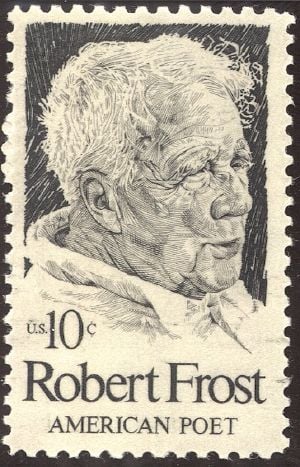Robert Frost
Robert Lee Frost (March 26, 1874 – January 29, 1963) was an American poet. Frost received four Pulitzer Prizes.
Although he is associated with New England, Frost was born in San Francisco to Isabelle Moodie, of Scottish birth, and William Prescott Frost, Jr., a descendant of a Devonshire Frost who had sailed to New Hampshire in 1634. The father was a former teacher turned newspaper man, a hard drinker, a gambler, and a harsh disciplinarian, who fought to succeed in politics for as long as his health allowed.
Frost lived in California until he was 11. After the death of his father, he moved with his mother and sister to eastern Massachusetts near his paternal grandparents. He grew up a city boy and published his first poem in Lawrence, Massachusetts. He attended Dartmouth College where he was a member of the Theta Delta Chi fraternity, and from 1897 to 1899, Harvard University where he studied Philology but he did not complete the degree. Eventually, after purchasing a farm in Derry, New Hampshire, he became known for his wry voice that was both rural and personal.
Frost was married to Elinor Miriam White and they had six children. In March, 1894, The Independent published Frost's poem "My Butterfly: An Elegy", his first published work which brought him $15. At this time, Robert made an important decision: he decided to devote his time to poetry instead of teaching. Robert wanted to move to Vancouver, his wife to England; the toss of a coin selected England.
So in 1912 Frost sold his farm and moved to England, to the Gloucestershire village of Dymock, to become a full-time poet. His first book of poetry, A Boy's Will, was published the next year. In England he made some crucial contacts including Edward Thomas (a member of the group known as the Dymock poets), T.E. Hulme, and Ezra Pound, who was the first American to write a (favourable) review of Frost's work. Frost returned to America in 1915, bought a farm in Franconia, New Hampshire and launched a career of writing, teaching and lecturing. From 1916 to 1938, he was an English professor at Amherst College. He encouraged his writing students to bring the sound of the human voice to their craft.
He recited his work, "The Gift Outright", at the inauguration of President John F. Kennedy in 1961 and represented the United States on several official missions. He also became known for poems that include an interplay of voices, such as "Death of the Hired Man". Other highly acclaimed poems include "Stopping by Woods on a Snowy Evening", "Mending Wall", "Nothing Gold Can Stay", "Birches", "After Apple Picking", "The Pasture", "Fire and Ice", "The Road Not Taken", and "Directive".
On his death on January 29, 1963, Robert Frost was buried in the Old Bennington Cemetery, in Bennington, Vermont. Harvard's 1965 alumni directory indicates his having received an honorary degree. During his later years he spent summers in Ripton, Vermont and participated in the Bread Loaf Writers' Conference at Middlebury College. During his life, the Robert Frost Middle School in Fairfax, Virginia and the main library of Amherst College were named after him. In 1971, the Robert Frost Middle School in Rockville, Maryland was named after him.
External links
- Robert Frost on Poets.org Biography, poems, and related essays, from the Academy of American Poets
- Brief biography at Kirjasto (Pegasos)
- Frost at Modern American Poetry
- Brief biography & poems
- Works by Robert Frost. Project Gutenberg
- Vast Collection of Poems and Quotes by Frost
- Several of Frost's early books online
- A collection of poetry by Robert Frost
- Review of Robert Frost’s Birches
- The Road Not Taken (Multi-media presentation)
- Robert Frost and Amherst College
- Theta Delta Chi International Fraternity
de:Robert Frost fr:Robert Frost no:Robert Frost pl:Robert Frost pt:Robert Frost sr:Роберт Фрост

